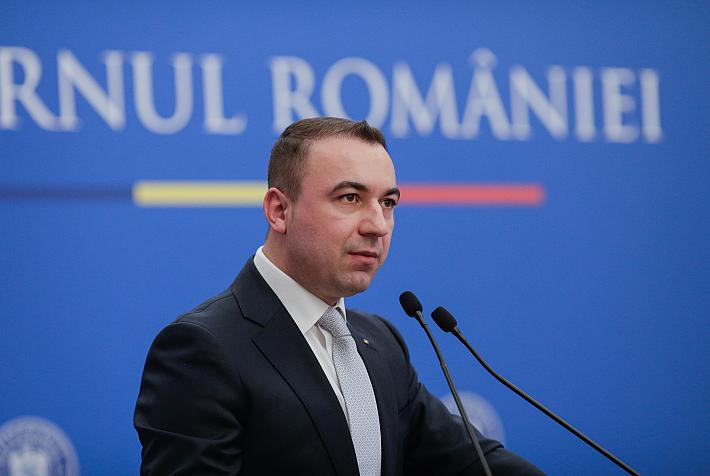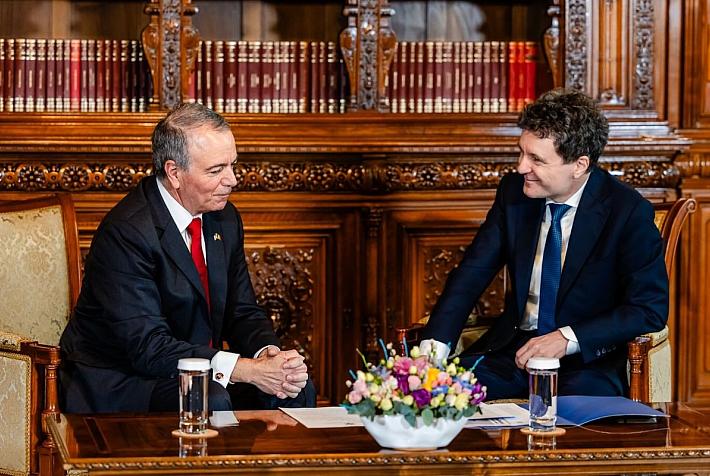Franklin Templeton executive: Romania has gone from risky to Eastern Europe’s darling

The severe measures taken by the Romanian authorities in the wake of the financial crisis have paid off, as they restored the country’s competitiveness and made it attractive for foreign investors. However, Romania must work on developing its equity market, which lags behind the bond market, according to David Smart, Managing Director of Franklin Templeton Solutions.
As the head of Franklin Templeton's sovereign funds division, David Smart was one of the key people who helped the American group set foot in Romania and win the contract to manage Fondul Proprietatea, Romania's largest investment fund, in 2009. Those were difficult times, when Romania would turn to the International Monetary Fund and the European Commission for a EUR 20 billion loan to keep its banking sector afloat and to prevent an abrupt depreciation of the local currency.
David Smart thinks that Romania has made much progress since then in balancing its economy and financial situation.
“Romania and the Baltics took some short-term pain after the financial crisis, implementing harsh austerity measures, but they are better right now than most of Europe. Romania has gone from being perceived as a risky investment destination to being the darling of Eastern Europe,” Smart said in an interview with Romanian journalists at the Franklin Templeton brand new headquarters in London.
He said that Romania is interesting for International bond investors due to several factors, such as the robust economic growth (+2.9% in 2014), the low public debt to GDP level (under 40%) and the stable exchange rate of the Romanian currency to the euro (around RON 4.45 per EUR). He also mentioned the progresses the country has made in recent years in fighting corruption and in improving the corporate governance of state-owned enterprises among the reasons why Romania is now more popular.
“As long as complacency doesn’t set in, there is a good chance Romania will continue to do rather well. The country’s labor market is very competitive, and the quality of the people is a key cornerstone for its development,” Smart said.
He added that Romania’s Ministry of Finance is going in the right direction as it has been working on extending the maturity of the public debt. Last year, Romania went out on international markets with 30-year bonds in US dollars.
The Finance Ministry sold bonds in foreign currency worth USD 2 billion and EUR 2.75 billion in 2014. The yields on Romanian 10-year bonds declined from 6.8%, in January 2012, to under 3%, in October 2014.
“The fundamentals have worked very well. Romania has been a good place to be invested in the bond market. Not so long time ago we would get 2-figure interest rates. Now, the 10-year bonds pay some 2.9%, which is still generous compared to the rest of Europe. This is why you will probably find higher interest in the Romanian bond market, as the RON is stable to the euro,” Smart said.
However, he pointed out that the debt capital market in Romania is ahead of the capital market. “We would like to see more capital market development, more IPOs, and sooner.”
The underdevelopment of the Bucharest Stock Exchange is one of the reasons why Franklin Templeton decided to list Fondul Proprietatea (FP), Romania’s largest investment fund, on the London Stock Exchange. The fund manager says that the secondary listing in London would bring in more institutional investors, many of which like the fund but aren’t willing to open trading accounts in Romania.
Franklin Templeton, which took over the management of FP in end-September 2010, has managed to attract almost EUR 1 billion in foreign investments to the fund and to bring down the discount at which the fund's shares are trading on the Bucharest Stock Exchange from over 50% of its net asset value per share to under 30%. The fund's shareholders now want to see the discount go further down, to under 15%. Franklin Templeton said that the secondary listing would help it achieve that target.
However, the Romanian financial regulator ASF and the Bucharest Stock Exchange have been opposing the fund’s dual listing, as they fear that the local market will lose liquidity to London. The fund last year generated about 30% of the total share transactions on the Bucharest Stock Exchange.
The ASF last year postponed the approval of a regulation that would allow Fondul Proprietatea to be listed on the London Stock Exchange via depository interests (DI), a financial instrument similar to shares. Franklin Templeton said it would float the fund in London no matter what and is willing to use global depository receipts (GDRs), which are financial instruments also similar to shares. Romanian companies Romgaz and Electrica have also used GDRs in their initial public offerings (IPOs) to draw money from the London Stock Exchange.
“Hopefully people will see the benefits of the fund’s London listing. There are large investors who don’t have accounts in Romania and who want to buy shares in the fund. Once they do this, they will become interested in other Romanian companies as well and could be persuaded to open accounts in Romania.”
The higher interest for Romania has been visible in the “Romania Investors’ Day” events organized in London and New York in recent years, where more and more institutional investors have been coming.
Some 90 investors attended the latest event, organized by the Bucharest Stock Exchange, Franklin Templeton and brokerage firm Wood&Co. in London, at the beginning of March. They listened to presentations made by Romanian state officials, but the highest interest was in meeting the representatives of Romanian companies for one-on-one discussions. Managers of some of the star companies, such as oil&gas group OMV Petrom and electricity producer Hidroelectrica had more than 30 meetings with investors and analysts in one day.
Like David Smart, most of the participants talked positively about Romania’s recent progresses. The only thing that’s missing, they said, is more listings in which they could actually invest.
Andrei Chirileasa, andrei@romania-insider.com












